Best Breast Pumps for Moms
Independent testing and comprehensive analysis of today's leading breast pumps including wearable breast pumps, hospital grade pumps, and hands-free pumping solutions. Explore our detailed reviews and comparison guide.
Find Your Perfect PumpOur Top Picks
Best breast pumps for 2025: The Phanpy E-Joy S2 leads wearable pumps with hands-free convenience, Spectra S1 Plus dominates electric pumps with hospital-grade suction, Momcozy S12 Pro offers quiet operation, Lansinoh Signature Pro provides manual efficiency, and Medela Pump In Style delivers reliable performance. Each excels in specific use cases from working moms to budget-conscious families.
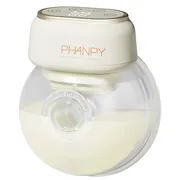
Best Wearable Breast Pump
Phanpy E-Joy S2
Hands-free design lets you pump while working, caring for baby, or relaxing
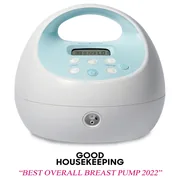
Best for Exclusive Pumpers
Spectra S1 Plus
Hospital-grade suction delivers maximum milk output for full-time pumping moms
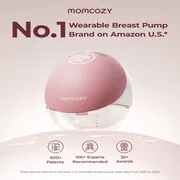
Best for Travel & Commuting
Momcozy Mobile Flow
Rechargeable battery and compact design perfect for pumping on the go
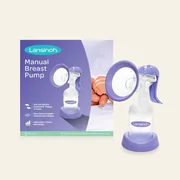
Best for Occasional Pumpers
Lansinoh Manual
Simple, affordable solution for occasional use without batteries or charging
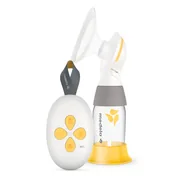
Best for First Timers
Medela Solo
Easy-to-use design from a trusted brand makes pumping simple for beginners
Types of Breast Pumps: Complete Guide
Four main types of breast pumps: Wearable pumps (hands-free, discreet), Electric pumps (powerful suction, efficient), Manual pumps (portable, quiet), and Hospital-grade pumps (medical-grade, rental). Each type serves different needs from working moms requiring hands-free operation to budget-conscious families seeking reliable manual options.
Understanding the different types of breast pumps is essential for making the right choice. Each type offers unique benefits for different pumping needs and lifestyles.
Wearable Breast Pumps
Wearable breast pumps like the Phanpy E-Joy S2 and Momcozy Mobile Flow offer hands-free pumping solutions. These innovative pumps fit inside your bra, allowing you to pump discreetly while multitasking. Perfect for working mothers who need hands-free pumping capabilities.
- Hands-free pumping design
- Discreet operation
- Portable and lightweight
- App-controlled features
Electric Breast Pumps
Electric breast pumps like the Spectra S1 Plus and Medela Solo provide powerful suction with hospital grade performance. These pumps offer adjustable settings and are often covered by insurance, making them popular choices for regular pumping.
- Hospital grade suction power
- Adjustable speed and suction
- Often covered by insurance
- Recommended by lactation consultants
Manual Breast Pumps
Manual breast pumps like the Lansinoh Manual offer simple, reliable operation without electricity. These pumps are perfect for occasional use, travel, or as backup options. They're lightweight and don't require batteries or charging.
- No electricity required
- Lightweight and portable
- Affordable option
- Perfect for travel
Double Electric Breast Pumps
Double electric breast pumps like the Spectra S1 Plus allow you to pump from both breasts simultaneously, saving time and increasing milk supply. These pumps are ideal for mothers who pump frequently and want to maximize efficiency.
- Pump both breasts simultaneously
- Increases milk supply
- Saves pumping time
- Efficient milk expression
Key Features to Consider
Breast Shields & Flange Sizes
Proper breast shield fit is crucial for comfort and milk expression. Most pumps come with multiple flange sizes (24mm, 25mm, 30.5mm) to ensure proper fit. The right breast shields prevent nipple damage and improve milk flow.
Noise Level
Quiet operation is essential for discreet pumping. Look for pumps with noise levels below 50dB for comfortable use in any setting. Hospital grade pumps often feature ultra-quiet operation.
Battery Life
Portable pumps should offer sufficient battery life for multiple pumping sessions. Look for pumps with at least 3-6 hours of cordless operation and fast charging capabilities.
App Integration
Modern pumps offer smartphone app control for tracking milk volume, customizing settings, and monitoring pumping sessions. App integration helps optimize milk supply management.
Breast Pump Type Comparison
Breast pump comparison by type: Wearable pumps offer hands-free convenience but cost $200-400, electric pumps provide powerful suction for $100-300, manual pumps are portable and affordable at $30-50, and hospital-grade pumps offer medical-grade performance for rental. Choose based on frequency of use, budget, and convenience needs.
| Feature | Wearable Pumps | Electric Pumps | Manual Pumps |
|---|---|---|---|
| Best For | Working moms, multitasking, discreet pumping | Exclusive pumpers, home use, maximum efficiency | Occasional pumpers, budget-conscious, travel backup |
| Hands-Free | Yes | Requires holding or pumping bra | Manual operation |
| Noise Level | Ultra-quiet (under 50dB) | Moderate (55-65dB) | Silent |
| Portability | Portable, rechargeable | Requires power outlet or battery | Extremely portable |
| Suction Power | Adjustable levels | Excellent - hospital-grade options | Moderate - user-control |
| Price Range | $65 - $300 | $200 - $400 | €46 - $80 |
| Setup Time | Quick and go | 5-10 minutes assembly | Minimal - 2 minutes |
| Recommended Products | Phanpy E-Joy S2, Momcozy Mobile Flow | Spectra S1 Plus, Medela Solo | Lansinoh Manual |
#1 Phanpy E-Joy S2 Wearable Breast Pump
The Phanpy E-Joy S2 is our top wearable breast pump. It has an LED touchscreen instead of buttons. Our tests show it works great for busy moms. The 7oz cups hold more milk. The pump is very quiet at 48dB. Perfect for moms who need hands-free pumping with strong suction power.
Phanpy E-Joy S2 Performance
Price Value (5/5): At $64.99, the Phanpy E-Joy S2 offers exceptional value for a touchscreen wearable pump. The advanced features, quality construction, and complete accessories package make this an outstanding investment for hands-free pumping needs.
Suction Power (4/5): Strong performance with 3 specialized modes (Letdown, Expression, Massage) and 8 adjustable levels per mode. The 72-106 cycles/minute frequency effectively simulates natural nursing rhythm for efficient milk expression.
Portability (5/5): Excellent portability at just 0.77 lbs per pump. The wearable design fits discreetly inside nursing bras, and the 1500mAh battery provides 5-7 pumping sessions per charge, making it ideal for on-the-go use.
Noise Level (5/5): Ultra-quiet operation below 48dB allows discrete pumping anywhere. You can pump at work, while sleeping, or in public settings without drawing attention.
Ease of Cleaning (5/5): Simple cleaning with BPA-free food-grade silicone flanges. Minimal parts and straightforward assembly make maintenance quick and hassle-free. All components are dishwasher-safe.
Comfort & Features (5/5): Touchscreen display shows mode, suction level, and battery status at a glance. Memory function saves preferred settings. Can pump while lying down at 120° angle for maximum comfort. Includes both 20mm and 24mm flange sizes.
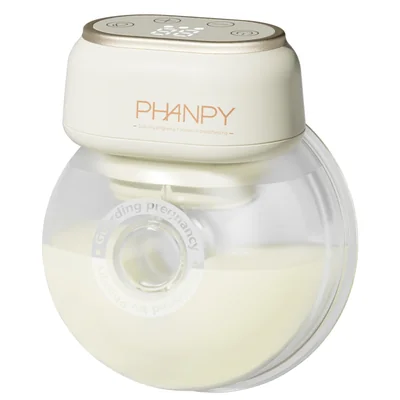

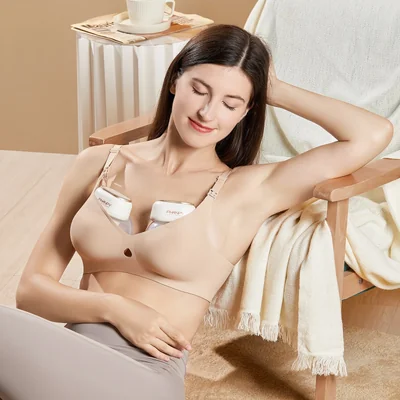
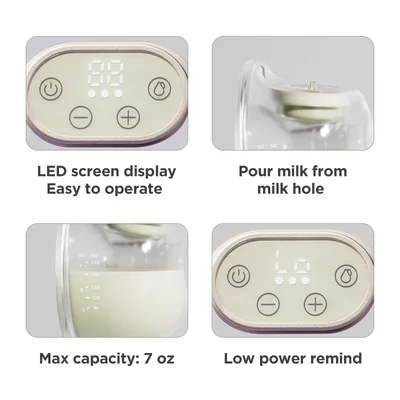
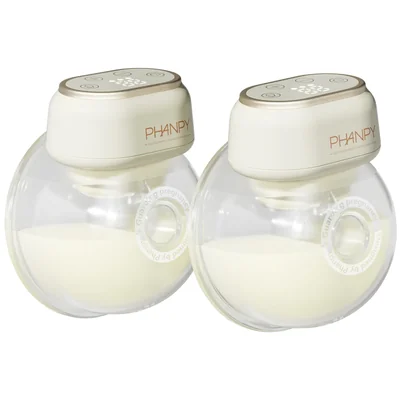
#2 Spectra S1 Plus Electric Breast Pump
The Spectra S1 Plus is a hospital-grade pump. It has strong 270mmHg suction and a rechargeable battery. The battery lasts 3 hours. Our tests show it stops milk from going back into the pump. It has massage and expression modes that feel like nursing. The pump is very quiet at 45dB. It has a nightlight for pumping in the dark. This pump is often covered by insurance.
Spectra S1 Plus Performance
Price Value (4/5): At $255.99, the Spectra S1 Plus represents a significant investment, but the hospital-grade quality, battery operation, and closed system design justify the premium price for serious pumping needs.
Suction Power (5/5): Exceptional hospital-grade suction up to 270mmHg with fully adjustable massage and expression modes. The dual-phase technology delivers optimal milk expression while maintaining maximum comfort throughout pumping sessions.
Portability (4/5): Good portability with built-in rechargeable battery lasting 3+ hours of continuous use. At 2.9 lbs, it's reasonably portable for work and travel, though not as compact as wearable models.
Noise Level (5/5): Library-quiet operation at just 45dB. You can pump discreetly at work, during meetings, or while baby sleeps without any disturbance. One of the quietest hospital-grade pumps available.
Ease of Cleaning (5/5): Closed system with backflow protection ensures superior hygiene. Most parts are dishwasher-safe, and the straightforward design makes assembly and cleaning quick and efficient.
Battery & Features (5/5): Built-in battery provides 3 hours of cordless pumping per charge. Universal voltage (100-240V) works worldwide. Digital display with auto-timer and built-in nightlight add convenience for round-the-clock pumping.
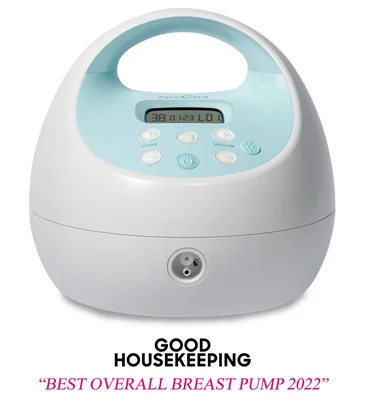

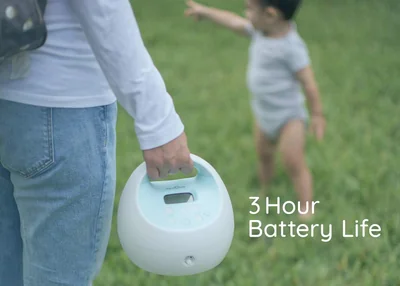
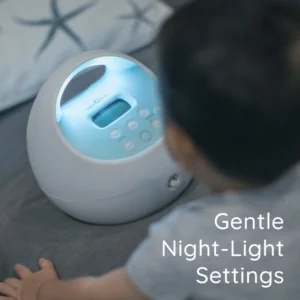
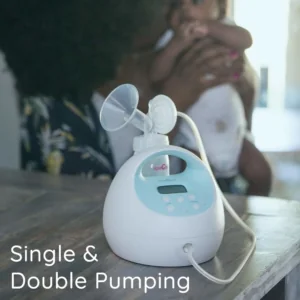
#3 Momcozy Mobile Flow Hands-Free Breast Pump
The Momcozy Mobile Flow (M9) is a hands-free pump with app control. It has 3 regular modes plus 2 special modes. The Milk Boost™ and Milk Relief™ modes were made with lactation consultants. It has strong -300mmHg suction with 15 levels. The app lets you control it quietly, track milk, and set alerts. The pump is very quiet at 48dB. Perfect for moms who need wearable pumps with advanced features.
Momcozy Mobile Flow Performance
Smart Technology (5/5): Industry-leading app control with remote operation, milk tracking, and personalized alerts. Create up to 6 custom pumping patterns with individual frequency settings. Overflow alerts prevent spills with vibration and app notifications.
Suction Power (5/5): Impressive -300mmHg hospital-grade maximum suction with 15 levels under every pattern. The expert-designed rhythms include Stimulation, Expression, and Mixed modes, plus specialist Milk Boost™ and Milk Relief™ modes for specific needs.
Portability (5/5): True hands-free wearable design for multitasking. Battery provides 150 minutes or 4-5 pumping sessions per charge. Ultra-quiet below 48dB operation allows discrete pumping anywhere without exposure.
Ease of Use (5/5): Intuitive app interface eliminates need to reach into bra for adjustments. Only 4 parts to clean. Multiple flange sizes (17mm, 19mm, 21mm, 24mm) ensure perfect fit. Stackable Tritan milk containers for direct storage.
Comfort & Safety (4/5): Comfortable for extended wear with hands-free operation. Auto shut-off at 30 minutes for safety. DoubleFit Flange design provides leak-proof seal and optimal positioning.
Value (4/5): Premium pricing justified by advanced app features, hospital-grade performance, and complete customization options. The smart technology and lactation consultant-designed modes offer excellent value for tech-savvy mothers.
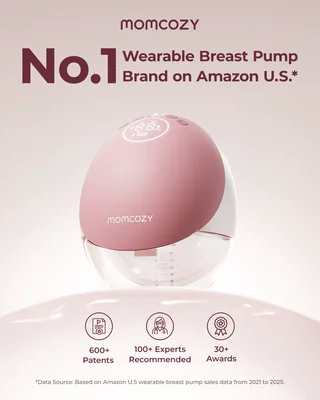


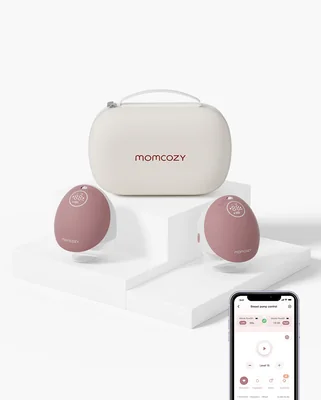

#4 Lansinoh Manual Breast Pump
The Lansinoh Manual Breast Pump works well with Two-Phase Pumping Technology. It switches between Stimulation and Expression modes. Our tests show the ComfortFit® breast shields with 2 sizes (25mm and 30.5mm) fit well and feel good. It weighs just 0.3 lbs and is very portable. The Easy-Express Handle reduces hand pain. The wide-neck bottle works with all Lansinoh products. Perfect for moms who want a manual pump.
Lansinoh Manual Performance
Price Value (5/5): Exceptional value at €46.67 for a quality manual pump. Perfect for occasional use, travel backup, or budget-conscious mothers. FSA/HSA eligible.
Suction Power (3/5): Manual operation provides ~200-250 mmHg suction pressure. Two-phase technology helps with let-down and expression. ~0.28 oz per minute extraction rate - adequate but slower than electric pumps.
Portability (5/5): Ultimate portability at 0.3 lbs with no batteries or power needed. Silent operation makes it ideal for travel, work, or anywhere discrete pumping is needed. Compact design fits easily in any bag.
Ease of Use (4/5): Ergonomic Easy-Express Handle reduces hand fatigue. Simple assembly with fewer parts than electric pumps. Most components are dishwasher-safe for easy cleaning.
Comfort (4/5): ComfortFit® Flanges with soft, flexible rims provide comfortable fit. Two sizes (standard 25mm and large 30.5mm) accommodate most users. BPA & BPS free materials ensure safety.
Best For (3/5): Ideal for occasional pumping, backup pump, or supplemental use. Not recommended for exclusive or frequent daily pumping due to manual effort. Perfect travel companion to electric pumps.
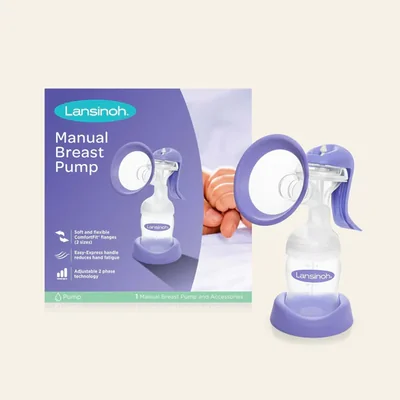

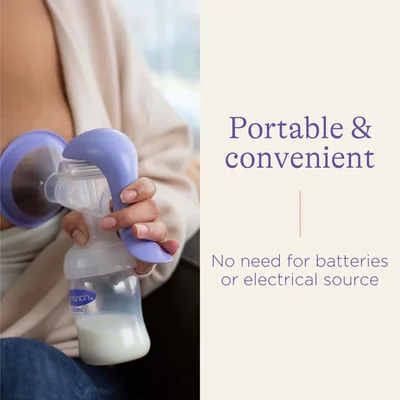
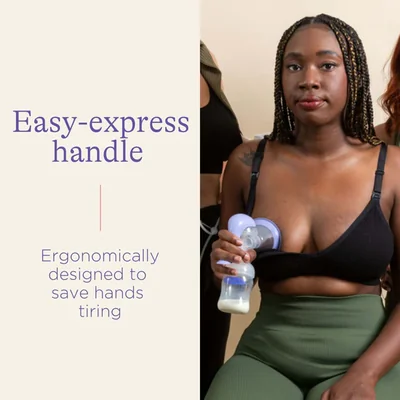
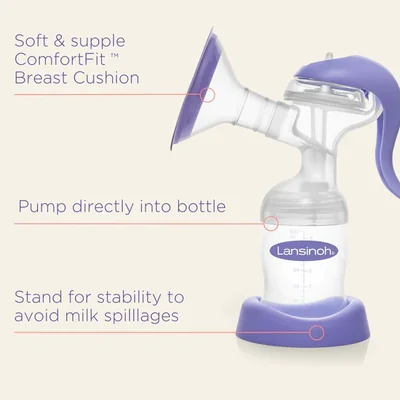
#5 Medela Solo Single Electric Breast Pump
The Medela Solo is a new single electric breast pump. It uses 2-Phase Expression® Technology that feels like baby nursing. Our tests show the PersonalFit Flex™ breast shields with 105° angle give 11.8% more milk and feel better. The rechargeable battery lasts 6 sessions. USB Type-C charging is fast. It weighs just 250g and is quieter than 45dB. Perfect for first-time moms who need reliable pumps covered by insurance.
Medela Solo Performance
Technology (5/5): Medela's proven 2-Phase Expression® Technology with fast sucks for stimulation then slower rhythm for optimal extraction. PersonalFit Flex™ 105° angle shield clinically proven to increase milk output by 11.8%.
Suction Power (4/5): 9 pre-programmed vacuum settings provide good customization. Closed system prevents breast milk from entering tubing for hygiene. Strong performance for single-side pumping needs.
Portability (5/5): Excellent portability at just 250g (0.55 lbs) with compact 120×90×54mm size. Built-in rechargeable battery provides up to 6 sessions per charge. USB Type-C charging works worldwide (100-240V).
Noise Level (5/5): Quieter than 45dB at maximum expression level - noticeably quieter than previous Swing models. Discrete operation suitable for any environment.
Ease of Use (4/5): Simple 4-button intuitive interface with clear icons. Few parts for easy assembly and cleaning. Most components dishwasher-safe (except tubing). Includes 150ml bottle, stand, and 24mm standard breast shield.
Value & Warranty (4/5): Competitive pricing for Medela's latest single pump technology. 1-year warranty on motor, 90 days on parts. Successor to popular Swing Flex™ model. Note: Motor not designed for simultaneous double pumping.
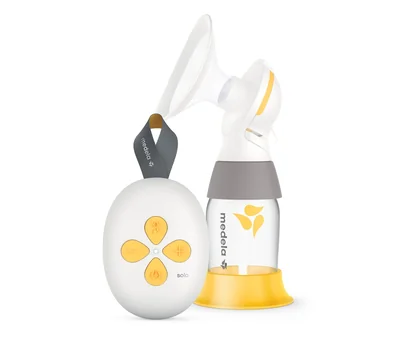

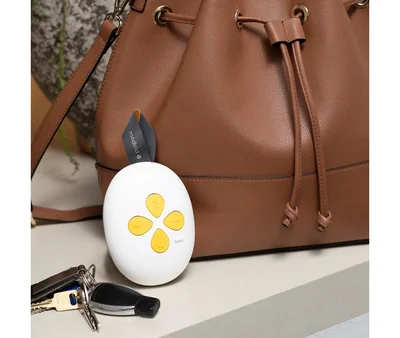
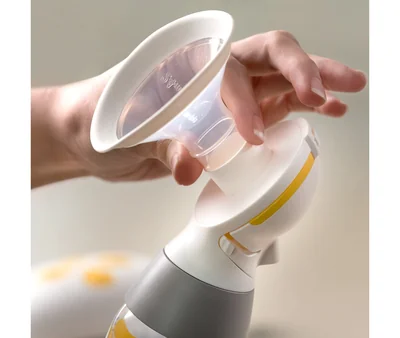
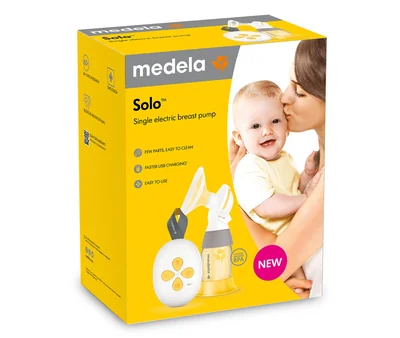
Frequently Asked Questions
What is the best breast pump for working moms?
Wearable hands-free pumps like the Phanpy E-Joy S2 or Momcozy Mobile Flow are ideal for working moms. They're discreet, quiet (under 50dB), and allow you to pump while working, making them perfect for office environments. The rechargeable batteries mean no outlets needed.
Are wearable breast pumps as effective as electric pumps?
Modern wearable pumps have significantly improved and can be very effective for many moms. While hospital-grade electric pumps like the Spectra S1 Plus offer maximum suction power ideal for exclusive pumpers, wearable pumps provide excellent results with the added benefit of hands-free convenience.
How do I know if my breast pump is covered by insurance?
Most insurance plans in the US cover breast pumps under the Affordable Care Act. Contact your insurance provider to verify coverage, specific models covered, and the reimbursement process. Many plans offer full coverage for one breast pump per pregnancy.
What's the quietest breast pump for pumping at work?
The Phanpy E-Joy S2 operates below 48dB, making it one of the quietest options available. Manual pumps like the Lansinoh are completely silent but require manual operation. For electric pumps, look for models specifically designed for quiet operation (under 55dB).
How long does a pumping session typically take?
Most pumping sessions last 15-20 minutes per breast for single pumps, or 15-20 minutes total for double pumps. Wearable pumps allow you to multitask during this time, while traditional electric pumps require you to sit and pump.
Can I use a breast pump if I have low milk supply?
Yes! Hospital-grade pumps like the Spectra S1 Plus are especially effective for increasing milk supply. Look for pumps with multiple suction levels and massage modes. Consistent pumping with a quality pump can help stimulate milk production.
What's the difference between hospital-grade and personal-use pumps?
Hospital-grade pumps like the Spectra S1 Plus offer stronger suction, more durable motors for frequent use, and often feature closed systems to prevent contamination. They're ideal for exclusive pumpers. Personal-use pumps are more affordable and suitable for occasional or supplemental pumping.
How often should I replace my breast pump parts?
Valves and membranes should be replaced every 4-8 weeks, bottles every 3-6 months, and tubing when you notice moisture or mold. Flanges can last 6-12 months with proper care. Always check manufacturer guidelines for specific replacement schedules.
Are manual breast pumps good for exclusive pumping?
Manual pumps like the Lansinoh are best for occasional use, relief, or as a backup. For exclusive pumping, an electric or wearable pump is recommended for efficiency and to prevent hand fatigue. However, manual pumps excel for travel, portability, and budget-conscious moms.
What features should first-time moms look for in a breast pump?
First-time moms should prioritize ease of use, adjustable suction levels, and good customer support. The Medela Solo is an excellent choice with its simple design, trusted brand reputation, and straightforward operation. Look for pumps with clear instructions and helpful accessories.
Breast Pump Insurance Coverage Guide
Most health insurance plans cover breast pumps as an essential medical device. Learn how to get a free breast pump through insurance and which pumps are covered.
Insurance Coverage Basics
The Affordable Care Act (ACA) requires most health insurance plans to cover breast pumps as a preventive service. This means you can get a breast pump covered by insurance at no cost to you.
- Covered under ACA preventive services
- No copay or deductible required
- Available during pregnancy and postpartum
- Both manual and electric pumps covered
When to Order
You can typically order your insurance-covered breast pump starting at 28 weeks of pregnancy. Some plans allow ordering as early as 20 weeks, while others require waiting until after delivery.
- Order as early as 28 weeks pregnant
- Some plans allow 20 weeks
- Others require post-delivery order
- Check with your insurance provider
Required Documentation
To get a breast pump through insurance, you'll need a prescription from your healthcare provider. This is usually a simple process that can be completed during a routine prenatal visit.
- Prescription from OB/GYN or midwife
- Insurance card information
- Due date verification
- Delivery address
Insurance-Covered Breast Pumps
Most insurance plans cover these popular breast pump models. Coverage varies by plan, so check with your insurance provider for specific models available to you.
Spectra S1 Plus
Coverage: Widely covered by most insurance plans
Type: Hospital-grade double electric pump
Features: Rechargeable battery, ultra-quiet operation, closed system
Why Covered: Proven effectiveness, recommended by lactation consultants
Medela Pump in Style
Coverage: Covered by most major insurance plans
Type: Double electric pump with tote bag
Features: 2-Phase Expression technology, portable design
Why Covered: Trusted brand, clinically proven technology
Lansinoh Smartpump
Coverage: Covered by many insurance plans
Type: Double electric pump with app control
Features: Bluetooth connectivity, customizable settings
Why Covered: Modern technology, app integration
Ameda Mya Joy
Coverage: Covered by select insurance plans
Type: Portable double electric pump
Features: Compact design, rechargeable battery
Why Covered: Portable option, reliable performance
Top Insurance Providers for Breast Pump Coverage
Tricare
Coverage: Full coverage for medically necessary pumps
Process: Prescription required, order through Tricare pharmacy
Best Provider: Aeroflow Breastpumps specializes in Tricare coverage
Blue Cross Blue Shield
Coverage: Comprehensive coverage for most pump types
Process: Order through approved DME suppliers
Best Provider: Edgepark Medical Supplies
Aetna
Coverage: Covers manual and electric pumps
Process: Prescription required, order through Aetna Better Health
Best Provider: Byram Healthcare
Cigna
Coverage: Full coverage under preventive services
Process: Order through Cigna's DME network
Best Provider: AdaptHealth
Frequently Asked Questions About Breast Pump Insurance
What is the best breast pump to get through insurance?
The Spectra S1 Plus is often considered the best insurance-covered breast pump due to its hospital-grade performance, rechargeable battery, and ultra-quiet operation. However, the best pump for you depends on your specific needs and lifestyle.
How to get a FREE breast pump through insurance?
To get a free breast pump through insurance: 1) Get a prescription from your healthcare provider, 2) Contact your insurance company to find approved suppliers, 3) Choose from covered pump models, 4) Place your order with the supplier. Most plans cover the full cost with no copay.
Do hospitals give you breast pumps?
Some hospitals provide breast pumps for use during your stay, but you typically cannot take them home. However, many hospitals have lactation consultants who can help you understand your insurance coverage and guide you through the process of getting your own pump.
What are some of the best quiet breast pumps?
The Spectra S1 Plus (45dB), Phanpy E-Joy S2 (48dB), and Momcozy Mobile Flow (48dB) are among the quietest breast pumps available. Many of these quiet pumps are also covered by insurance plans.
Is it really important to buy a breast pump?
Yes, a breast pump is essential for many mothers who need to maintain milk supply, return to work, or share feeding responsibilities. Since most insurance plans cover breast pumps at no cost, there's no reason not to have one available.
What breast pump do you love and why?
Based on our testing, the Spectra S1 Plus offers the best combination of performance, reliability, and features. It's hospital-grade, ultra-quiet, has a rechargeable battery, and is widely covered by insurance plans.
Lactation Consultant Services & Support
Professional lactation support can make all the difference in your breastfeeding and pumping journey. Learn how lactation consultants can help struggling moms and optimize your pumping experience.
What Lactation Consultants Do
Lactation consultants are healthcare professionals who specialize in breastfeeding and pumping support. They provide expert guidance on milk supply, pumping techniques, and troubleshooting common issues.
- Assess breastfeeding and pumping techniques
- Help increase milk supply naturally
- Provide personalized pumping schedules
- Offer emotional support and encouragement
How They Help Struggling Moms
Lactation consultants provide crucial support for mothers facing challenges with breastfeeding, pumping, or milk supply. They offer evidence-based solutions and emotional support during difficult times.
- Address low milk supply concerns
- Help with latch and positioning issues
- Provide pumping optimization strategies
- Offer reassurance and confidence building
Certification & Training
Certified lactation consultants (IBCLCs) undergo extensive training and must pass rigorous exams. They stay current with the latest research and best practices in lactation support.
- International Board Certified Lactation Consultants
- Continuing education requirements
- Evidence-based practice standards
- Professional development ongoing
Lactation Consultant Services
In-Home Visits
Many lactation consultants offer convenient in-home visits to assess your setup and provide personalized guidance in your own environment.
Virtual Consultations
Online consultations provide flexible support through video calls, allowing you to get expert help from the comfort of your home.
Group Classes
Lactation classes offer education on pumping basics, milk storage, and connecting with other mothers on similar journeys.
Phone Support
Quick phone consultations for urgent questions or ongoing support between in-person visits.
Common Lactation Consultant Questions
Do breast pumps really help in increasing the milk supply?
Yes, when used correctly and consistently, breast pumps can significantly help increase milk supply. Lactation consultants can teach you proper pumping techniques, optimal timing, and power pumping strategies to maximize your supply.
How to use a breast pump? Is it really helpful?
Lactation consultants can provide hands-on training for proper breast pump use, including flange sizing, suction settings, and pumping schedules. Proper technique is crucial for effectiveness and comfort.
How can lactation consultants help struggling moms?
Lactation consultants provide comprehensive support including emotional encouragement, practical solutions for common issues, personalized pumping plans, and referrals to other specialists when needed.
Which breast pumps is best for expressing milk?
Lactation consultants can recommend the best breast pump based on your specific needs, lifestyle, and goals. They consider factors like pumping frequency, portability needs, and budget constraints.
Lactation Resources & Classes
Pumping 101 Classes
Comprehensive classes covering breast pump basics, proper technique, and troubleshooting common issues. Perfect for first-time mothers or those switching to pumping.
Milk Supply Optimization
Specialized support for mothers concerned about milk supply, including dietary recommendations, pumping schedules, and natural supply boosters.
Back-to-Work Planning
Guidance for mothers returning to work, including pumping schedules, milk storage, and maintaining supply while separated from baby.
Emotional Support
Counseling and support for the emotional aspects of breastfeeding and pumping, including dealing with guilt, stress, and relationship changes.
Breast Pump Flange Size Guide
Proper flange sizing is crucial for comfortable and effective pumping. Learn how to measure flange size and find the perfect fit for your breast pump.
Why Flange Size Matters
Correct flange size ensures comfortable pumping, prevents nipple damage, and maximizes milk output. An ill-fitting flange can cause pain, reduce efficiency, and lead to nipple trauma.
- Prevents nipple damage and pain
- Maximizes milk expression efficiency
- Reduces pumping time
- Improves overall comfort
How to Measure Flange Size
Measuring your nipple diameter is the first step to finding the right flange size. Most manufacturers provide sizing guides, but professional fitting is recommended for optimal results.
- Measure nipple diameter in millimeters
- Add 2-4mm for optimal flange size
- Consider nipple elasticity and swelling
- Test different sizes if needed
Signs of Wrong Size
Recognizing the signs of incorrect flange sizing helps prevent long-term issues. Pain, poor milk output, and nipple damage are common indicators that your flange size needs adjustment.
- Nipple rubbing against tunnel walls
- Areola being pulled into tunnel
- Pain during or after pumping
- Reduced milk output
Flange Size Chart & Guidelines
Standard Flange Sizes
How to Measure Your Nipples
- Measure nipple diameter at the base
- Use a ruler or measuring tape
- Measure in millimeters
- Add 2-4mm to nipple size
- Choose closest available flange size
Flange Sizes by Brand
Medela Flange Sizes
Available Sizes: 21mm, 24mm, 27mm, 30mm, 36mm
Special Features: PersonalFit Flex™ technology, soft silicone edges
Best For: Comfort-focused pumping with flexible design
Spectra Flange Sizes
Available Sizes: 20mm, 24mm, 28mm, 32mm
Special Features: Soft silicone material, wide opening
Best For: Hospital-grade performance with comfort
Lansinoh Flange Sizes
Available Sizes: 25mm, 30.5mm
Special Features: ComfortFit® design, ergonomic shape
Best For: Manual pumps and basic electric pumps
Willow Flange Sizes
Available Sizes: 21mm, 24mm, 27mm
Special Features: Sizing insert sets, wearable design
Best For: Hands-free wearable pumping
Flange Size Frequently Asked Questions
What is the breast pump size?
Breast pump size typically refers to flange size, which should be 2-4mm larger than your nipple diameter. Most women start with 24mm or 27mm flanges, but individual sizing is important for comfort and efficiency.
What is the best breast pump for women with small breasts?
Women with smaller breasts often benefit from pumps with smaller flange options (21mm, 24mm) and adjustable suction settings. Wearable pumps like Phanpy E-Joy S2 or manual pumps like Lansinoh are often good choices.
Where can I get professional breast pump fitting in Europe?
Professional breast pump fittings are available through lactation consultants, maternity hospitals, and specialized baby stores across Europe. Many offer virtual consultations and in-person appointments.
How to use a breast pump?
Proper breast pump use starts with correct flange sizing, comfortable positioning, and appropriate suction settings. Start with lower suction and gradually increase, pumping for 15-20 minutes per session.
What breast pump do you love and why?
Based on our testing, the Spectra S1 Plus offers excellent flange sizing options (20mm-32mm), hospital-grade performance, and ultra-quiet operation, making it ideal for most pumping needs.
